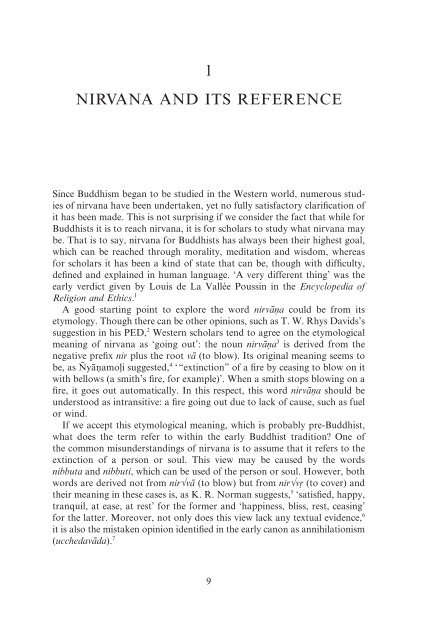Metaphor and Literalism in Buddhism: The ... - misterdanger.net
Metaphor and Literalism in Buddhism: The ... - misterdanger.net
Metaphor and Literalism in Buddhism: The ... - misterdanger.net
You also want an ePaper? Increase the reach of your titles
YUMPU automatically turns print PDFs into web optimized ePapers that Google loves.
NIRVANA AND ITS REFERENCE<br />
1<br />
NIRVANA AND ITS REFERENCE<br />
S<strong>in</strong>ce <strong>Buddhism</strong> began to be studied <strong>in</strong> the Western world, numerous studies<br />
of nirvana have been undertaken, yet no fully satisfactory clarification of<br />
it has been made. This is not surpris<strong>in</strong>g if we consider the fact that while for<br />
Buddhists it is to reach nirvana, it is for scholars to study what nirvana may<br />
be. That is to say, nirvana for Buddhists has always been their highest goal,<br />
which can be reached through morality, meditation <strong>and</strong> wisdom, whereas<br />
for scholars it has been a k<strong>in</strong>d of state that can be, though with difficulty,<br />
def<strong>in</strong>ed <strong>and</strong> expla<strong>in</strong>ed <strong>in</strong> human language. ‘A very different th<strong>in</strong>g’ was the<br />
early verdict given by Louis de La Vallée Pouss<strong>in</strong> <strong>in</strong> the Encyclopedia of<br />
Religion <strong>and</strong> Ethics. 1<br />
A good start<strong>in</strong>g po<strong>in</strong>t to explore the word nirvAOa could be from its<br />
etymology. Though there can be other op<strong>in</strong>ions, such as T. W. Rhys Davids’s<br />
suggestion <strong>in</strong> his PED, 2 Western scholars tend to agree on the etymological<br />
mean<strong>in</strong>g of nirvana as ‘go<strong>in</strong>g out’: the noun nirvAOa 3 is derived from the<br />
negative prefix nir plus the root vA (to blow). Its orig<strong>in</strong>al mean<strong>in</strong>g seems to<br />
be, as Ñyaoamoti suggested, 4 ‘“ext<strong>in</strong>ction” of a fire by ceas<strong>in</strong>g to blow on it<br />
with bellows (a smith’s fire, for example)’. When a smith stops blow<strong>in</strong>g on a<br />
fire, it goes out automatically. In this respect, this word nirvAOa should be<br />
understood as <strong>in</strong>transitive: a fire go<strong>in</strong>g out due to lack of cause, such as fuel<br />
or w<strong>in</strong>d.<br />
If we accept this etymological mean<strong>in</strong>g, which is probably pre-Buddhist,<br />
what does the term refer to with<strong>in</strong> the early Buddhist tradition? One of<br />
the common misunderst<strong>and</strong><strong>in</strong>gs of nirvana is to assume that it refers to the<br />
ext<strong>in</strong>ction of a person or soul. This view may be caused by the words<br />
nibbuta <strong>and</strong> nibbuti, which can be used of the person or soul. However, both<br />
words are derived not from nir√vA (to blow) but from nir√vK (to cover) <strong>and</strong><br />
their mean<strong>in</strong>g <strong>in</strong> these cases is, as K. R. Norman suggests, 5 ‘satisfied, happy,<br />
tranquil, at ease, at rest’ for the former <strong>and</strong> ‘happ<strong>in</strong>ess, bliss, rest, ceas<strong>in</strong>g’<br />
for the latter. Moreover, not only does this view lack any textual evidence, 6<br />
it is also the mistaken op<strong>in</strong>ion identified <strong>in</strong> the early canon as annihilationism<br />
(ucchedavAda). 7<br />
9











